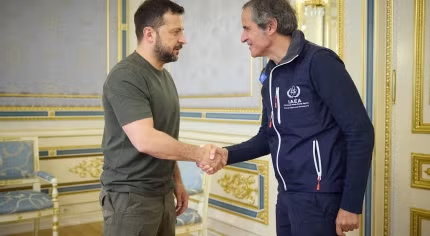
The International Atomic Energy Agency (IAEA) will further expand its assistance to Ukraine by taking a more proactive stance to protect the status of vital energy infrastructure to ensure it does not impact nuclear safety, Director General Rafael Mariano Grossi said after meeting President Volodymyr Zelensky in Kyiv. This follows a number of missile attacks that have either directly caused the disconnection of several nuclear power reactors, or led to dangerous instability of the national grid. Gross also had talks with Energy Minister Herman Halushchenko.
An IAEA expert team will soon travel to some of the damaged Ukrainian sub-stations – electrical switchyards forming the backbone of the grid – that have been identified as essential for nuclear safety. They will assess the situation at these sites and report back to headquarters for possible follow-up actions.
“The safety of operating NPPs is dependent on a stable and reliable connection to the electricity grid. As a result of the war, the situation is becoming increasingly vulnerable and potentially even dangerous in this regard,” Grossi said. “I agreed with President Zelensky that the IAEA will widen its determined activities to help prevent a nuclear accident during the conflict and look closer at this important aspect of nuclear safety and security. Our experts will apply the Agency’s nuclear industrial safety and critical infrastructure protection expertise to assess these sub-stations.”
The IAEA already has specialist teams stationed at all of Ukraine’s NPPs to help maintain nuclear safety and security during the military conflict. The sub-stations essential for nuclear safety are located in different parts of the country, making the evaluation of these facilities also relevant.
Increased pressure on Ukraine’s energy infrastructure over the past six months have caused instability in the grid, posing serious problems for Ukraine’s NPPs. Access to reliable supplies of off-site power forms part of the Seven Indispensable Pillars for maintaining nuclear safety and security during an armed conflict outlined by Director General Grossi in March 2022.
On 26 August, widespread strikes targeting Ukraine’s energy infrastructure caused major fluctuations in the power supply and led to the temporary shutdown or disconnection of reactor units at the Rivne and South Ukraine NPPs, one of which has still not returned to full operation, IAEA said. The off-site power situation at the Khmelnitsky NPP and Chornobyl site was also affected.
“The heightened vulnerability of Ukraine’s energy infrastructure is deeply concerning for nuclear safety at Ukraine’s nuclear power plants, as we saw last week when several reactors stopped operating because of damage to the energy infrastructure elsewhere in the country,” Grossi noted.
“Ensuring that the sub-stations can operate normally for safety related purposes is also of paramount importance for energy security in Ukraine, as the country to a large extent relies on the nuclear power plants for much of its electricity generation,” he said.
In Kyiv, Grossi also agreed with President Zelensky that the IAEA will provide technical support and nuclear safety advice for Ukraine’s plans to purchase equipment from the interrupted Bulgarian project in Belene for the Khmelnitsky NPP. This will help Ukraine ensure that this ongoing project continues in accordance with safety standards.
Grossi confirmed to reporters that he had accepted a Ukrainian request to expand inspections to include electricity substations providing power to Ukraine’s NPP. He did not give further details but noted: “This is a new dimension, an important dimension I hope, of our support here, which we discussed and agreed with President Zelenskyy just now.”
From Kyiv, Grossi and his team proceeded to the Zaporizhia NPP, crossing the frontline into Russian-controlled territory (see related story).






